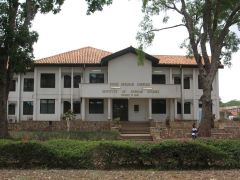Library sigla - A special RISM subproject from the beginning
Thursday, December 12, 2024

The first RISM library sigla were created in the 1950s in preparation for the first volume of Series B (Recueils imprimés, XVIe-XVIIe siècles), eventually published in 1960 by Henle Verlag. The overview of sigla presented in the volume lists 920 music libraries located in 23 countries. Today, after 65 more years of ongoing cataloguing, we keep a record of over 9,000 RISM sigla from 87 countries.
Precursors of RISM’s library sigla had long been used in musicology. In music encyclopedias, bibliographies, catalogs of works and sources, as well as in diverse scholarly publications, the introduction of abbreviations for the purposes of citation and source reference proved as good as unavoidable in the interest of both space and time. Initially, each author created his or her own abbreviations for the libraries cited. For instance, in Marc Pincherle’s 1948 catalog of Antonio Vivaldi’s instrumental music “Berlin, Fuchs” refers to the Aloys Fuchs collection kept in the Staatsbibliothek zu Berlin (RISM siglum: D-B). While this practice implied little to no consistency across different publications, multi-volume undertakings such as music encyclopaedias generally required some standardization of the abbreviations and sigla, which had to be identical in every part. This allowed for shorter lists of abbreviations and a more concise annotation apparatus, while also making the content easier to understand in general.
Robert Eitner first used abbreviations for music libraries in his seminal Biographisch-bibliographisches Quellen-Lexikon der Musiker und Musikgelehrten, the first edition of which was published in Leipzig between 1900 and 1904. However, his abbreviations tell the user little about the actual name of the institution, or the country and the place where it is located, and are also not systematic. “B. B.” stood for the Königliche Bibliothek zu Berlin, while the Königliche Hausbibliothek im Schlosse zu Berlin was abbreviated as “Berlin K. H.”.
With the launch of RISM’s large-scale international documentation projects, the scene has changed completely. In the B/I volume, several locations and libraries are cited for any given country, and there are as a rule multiple libraries listed even for a single city. A case in point is Cambridge in the United Kingdom, which is represented in the volume with no fewer than 15 libraries. This prompted a more systematic structuring of the RISM library sigla, which as a rule have three parts, and consist of a country siglum, a siglum for the city, and a third siglum for the library (or other institution). The country and city sigla are always in capital letters, whereas the institution siglum is in lower case. For example, GB-Cu is the siglum for the University Library (u) of Cambridge (C) in Great Britain (GB). Note that a minus sign always follows the country abbreviation (which generally corresponds to the international vehicle registration code).
With the RISM publications belonging to series B, A/I and later A/II, RISM’s library sigla came increasingly to be viewed as a standard, prompting their ever wider use also in musicological publications. Rita Benton cited RISM library sigla in her 1977 thematic catalog of Ignace Pleyel’s works, and general acceptance was indicated by the decision of major international music encyclopedias such as Die Musik in Geschichte und Gegenwart (MGG) and The New Grove Dictionary of Music and Musicians to also adopt RISM library sigla in their entries from the early 1980s and the 1990s on, respectively.
The country with the most RISM library sigla is Italy. It currently has 2,166 RISM sigla, followed by Germany with 1,784 sigla. In third place is the USA with 685 sigla, while France has 535, Spain 506, Austria 330 and the Czech Republic 296 sigla. Two new countries were added to the list this year: San Marino and Ghana, currently with one siglum each (RSM-SMbs - RISM Catalog | RISM Online and GH-Lkna - RISM Catalog | RISM Online).
RISM publishes the RISM library sigla on its website in a separate catalog that is linked to RISM Online. You can search here for basic information such as library names, locations, countries, RISM sigla and also keywords.
A siglum entry can contain the following information: name of the institution, city, country, additional information such as previous names, links to other collections or holdings, earlier sigla (no longer valid, e.g. from the older RISM series), address and other contact details, a link to the library’s website, Google Maps code to help locate the library in question, as well as the corresponding IDs from VIAF, the GND, or ISIL, if available. In addition, there are direct links to source descriptions in the RISM database for more than 3,000 sigla.
If a collection is taken over in whole or in part by another library, this can be indicated in the respective records without necessarily changing or deleting a siglum. The entry for D-DO includes a link to D-KA as the current owner of the music collection, whereby the notes in the D-DO entry make clear that the Fürstlich Fürstenbergische Hofbibliothek in Donaueschingen is still an operating library, though with but a small number of music items.
The RISM Editorial Center makes every effort to keep its authority data up to date. The Greek RISM working group has already set a good example by systematically revising all sigla entries for Greece, and we encourage all RISM working groups and IAML national branches to update and expand the institution records for their country directly in our cataloging program Muscat. We are also happy to receive notifications from our users regarding name and address changes for music libraries.
If you need a new RISM siglum, since you cannot yet find the institution in question in our database, please contact us directly at contact@rism.info.
Image: The Institute of African Studies building in Legon Campus, University of Ghana, Accra, Ghana (GH-Lkna) via Wikimedia Commons, CC BY-SA 3.0.
Share Tweet EmailCategory: New at RISM

